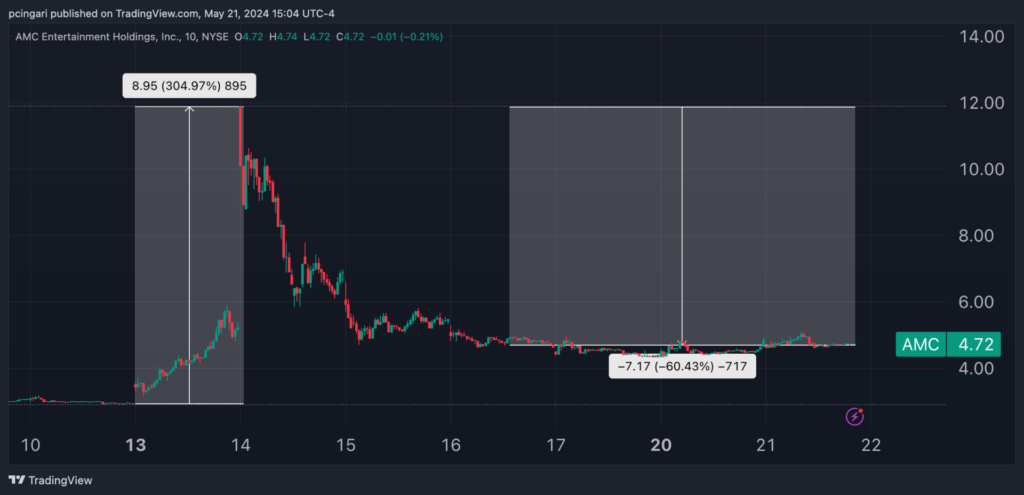Zinger Key Points
- AMC shares surged 300% after Keith Gill's return, then fell over 60% to $4.71.
- AMC's 10%-coupon bond rose to 87 cents on the dollar, yielding 30%.
- Get two weeks of free access to pro-level trading tools, including news alerts, scanners, and real-time market insights.
Shares of AMC Entertainment Holdings Inc. AMC have experienced extreme volatility in recent weeks, ignited by the return of Keith Gill—also known as Roaring Kitty — to social media. This resurgence has sparked a meme-stock frenzy reminiscent of the wild trading days of 2021.
After closing at $2.91 on Friday, May 10, AMC Entertainment’s stock skyrocketed to as high as $11.88 on Tuesday, May 12, marking an approximate 300% spike before plummeting to Tuesday’s price of $4.73 per share.
Chart: AMC’s Wild Ride During May 2024 Meme Stock Mania

Yet this wild volatility in AMC shares has not been mirrored by similar movements in the company’s bonds.
AMC’s 10%-coupon bond maturing in June 2026, which was part of last year’s debt exchange, increased by approximately 15 points last week to 87 cents on the dollar and has maintained most of those gains.
The yield to maturity for this bond is around 30%, meaning an investment of $10,000 could potentially generate about $6,000 in gains if AMC pays back the bond at maturity. Comparatively, an equity investor would need the stock to perform significantly better to achieve similar returns over the same period.
Is Investing In AMC Bonds Worth The Risk? S&P Global Raises Concerns
While AMC bonds offer highly appealing returns, high yields often come with a similarly high risks.
High-yield bonds, often referred to as “junk bonds,” such as those issued by AMC, are typically issued by companies with lower credit ratings, reflecting a higher risk of default.
S&P Global Ratings highlighted this concern in February 2024, downgrading AMC from “CCC+” to “SD” (selective default).
The rating agency noted that AMC completed several debt-for-equity exchanges in the fourth quarter of 2023. In total, the company exchanged $123 million of its 10%/12% cash/payment-in-kind (PIK) second-lien notes due 2026 for approximately 16.7 million shares of its Class A common stock.
“We view these transactions as distressed and tantamount to a default,” analyst Oliver Vandestouwe wrote in a report. This is because “lenders will receive less than the original promise of the securities due to the deferral of payment and subordination, which is not offset by adequate compensation.”
Additionally, S&P Global views AMC’s capital structure as unsustainable and subject to default risk given its heavy debt burden and limited free operating cash flow.
AMC Price Action: AMC shares were trading down 2.07% at $4.73 late in Tuesday’s session.
Photo via Shutterstock.
© 2025 Benzinga.com. Benzinga does not provide investment advice. All rights reserved.
Trade confidently with insights and alerts from analyst ratings, free reports and breaking news that affects the stocks you care about.